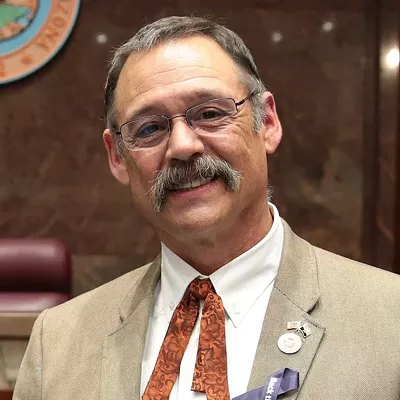Even though Glenn Brown and the U.S. Navy didn't agree on much, both concede that he proudly served his country.
But a few years after parting ways ("I learned I didn't like taking orders," Brown admits), he found himself lost in a sea of booze and drugs. By 2003, he was on the streets.
Now 48, he describes the years that followed as a living hell. "You have to resort to a lot of things that you wouldn't really do if you had a roof over your head: dealing with people you normally wouldn't deal with, going to places you wouldn't really want to have to be in—abandoned buildings, washes, abandoned cars."
However, one thing not in short supply on those mean streets was fellow vets.
"I noticed that more of them were homeless due to psychological problems than substance abuse," Brown says. "Then once they're homeless, they can't get the meds they really need, and then they resort to substance abuse."
"A lot of them aren't on the streets just strictly from their experience with the military. But something in the military may have caused a reaction, and they just can't deal with society as they should."
Nor does it seem that society is always willing to deal with them. According to a joint report from the U.S. Department of Veterans Affairs and the Department of Housing and Urban Development, 16 percent of the America's homeless are veterans. But those stats are contested: According to the advocacy group Iraq and Afghanistan Veterans of America, up to one-third of all homeless people are veterans, although they only constitute a tenth of this nation's adult population.
Those number disputes filter down to Tucson as well. While officials with the Southern Arizona VA Health Care System estimate the number of vets living on our streets at 800 to 1,200, one veteran-services coordinator pegs the number as nearly 10 times higher. Meanwhile, shelters and transitional homes for vets report months-long waiting lists.
While the numbers are debatable and the services stretched, the community does include a network of service providers, from the Primavera Foundation to the VA itself, dedicated to helping homeless vets.
The Obama administration has also stepped up: Last year, the Department of Veterans Affairs directed nearly $42 million in funds to the issue, resulting in more than 2,500 beds nationwide for homeless vets. In addition, a collaborative effort called the HUD VA-Supportive Housing Program has reportedly decreased homelessness among veterans by more than half in recent years.
But that still leaves numerous discharged veterans on the streets, many of them afflicted with a grab bag of maladies. "Vets have lots of different reasons for being homeless," says Martin Twohill, clinical director of the Southern Arizona VA's rehabilitation program. "War oftentimes changes them. Military service can change them. Probably about 70 percent of the homeless who we see here have substance abuse or mental illness in their lives."
While those problems are hardly unique to veterans, they are further aggravated by post-traumatic-stress disorder, says Twohill.
To help, the VA offers assistance ranging from transitional housing to mental-health or substance-abuse treatment. The agency also sponsors "Stand Down" events where advocates seek out homeless vets, providing them with food, clothing and referrals.
Simple economics also play a role; many vets from the wars in Iraq and Afghanistan are returning with few marketable job skills.
"We're talking about the guys who went in straight from high school, thinking it was their patriotic duty, because Uncle Joe or Dad was in the Marine Corps," says Larry Byrd, a former jobs coordinator with the Arizona Department of Veterans Services. Byrd now runs his own employment-referral service for vets.
"Those guys are coming out (of the military) now—a lot of them with severe injuries, a lot of them with PTSD—and with no job skills," he says. "... The only skills they have are what they were taught in the military."
Still, Byrd says the VA does offer a number of incentives for hiring vets, including 50 percent salary reimbursements for on-the-job training, and generous tax credits that can save employers thousands of dollars.
The Pima County Sheriff's Department tapped that program in the 1990s, hiring many entry-level deputies and corrections officers, says Byrd. "I know they saved $750,000 to $1 million in employee wages. And those veterans brought transferable (law-enforcement) skills directly to the employer."
Veterans who aren't so fortunate may land on the streets, providing a constant challenge for local assistance groups. Phyllis Russell is executive director of Esperanza En Escalante, a transitional housing facility for veterans on Tucson's southside. Even with its 19 multi-bedroom homes, there's never enough space, says Russell. "Tucson is pretty maxed-out on the number of beds. ... We usually have a six-month waiting list."
For other veterans such as Glenn Brown, the Primavera Foundation has offered both temporary shelter and referral services. Not long ago, the organization helped him find work as grill cook. Today, he has his own apartment.
The foundation also offers services that range from case management to job training, and recently received a $200,000 federal grant to provide job training for up to 80 homeless vets.
"The emphasis of that training is on green jobs," says Karen Caldwell, Primavera's director of workforce development. "That includes anything in the solar industry or xeriscape landscaping, for example, or working with sustainable construction materials."
This isn't just a feel-good strategy: She says the U.S. Labor Department is directing these funds toward a growth industry, which will ultimately lead to more jobs.
Even with such grants, however, the need to help homeless veterans perennially outstrips the funding. "We can always use more resources," Caldwell admits.
And Glenn Brown still sees far too many veterans falling through the cracks. In part, he blames the military for failing to help vets readjust to the civilian world, where their daily lives aren't constantly dictated from above.
"Once you get out of the military, you're so used to being told what to do that you can't think on your own," he says. "They just say, 'You've got to go. Bye.'"










